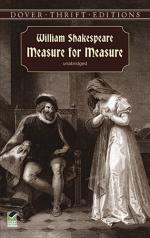|
This section contains 10,737 words (approx. 36 pages at 300 words per page) |

|
Huston Diehl, University of Iowa
Measure for Measure is a deeply dissatisfying comedy, so problematic that, as Jean Howard argues, it "puts critics under stress."1 They typically respond by judging, finding fault with the play's structure, the Duke's elaborate manipulations, Isabella's ethical choices, Shakespeare's use of the bed-trick, and, especially, the final trial scene, with its exaggerated theatricality, its failure to effect any real reformation, and its unsettling subversion of the conventional comic ending.2 Identifying a pattern of failed, inadequate, and problematic substitutions in Measure for Measure, Alexander Leggatt, like many other critics, concludes that the play is flawed:
I am not saying that Shakespeare, in order to make a point about the imperfection of his art, deliberately wrote an imperfect play. .. . He seems, however, to have found Measure for Measure a harder struggle than most, and as he faced the gap between conception and embodiment, his imagination...
|
This section contains 10,737 words (approx. 36 pages at 300 words per page) |

|


